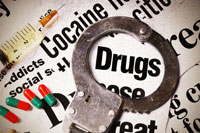For many years I have been the crazy guy in the room. The one who thinks our war on drugs is epically idiotic and destructive. The one who dares to suggest that maybe we shouldn't make criminals out of drug users, and that prohibition has never worked anywhere, anytime in the entire known history of the world. The one who believes that our war on drugs, like all wars, is hardening our hearts and inuring us to ever increasing collateral damage.
But trying to penetrate the fear and ignorance underlying our misbegotten drug war has been a long, lonely and frustrating effort.
If you are a person of a certain age or a student of history, you know what I'm talking about. In the mid 1970's, following Richard Nixon's launch of a great drug war offensive (part of an odious, but effective, political strategy that conflated drugs and crime and race), there was a brief armistice under Jimmy Carter. As many states decriminalized marijuana possession, many drug policy reformers thought we were headed toward a more enlightened drug policy.
Then, thanks to Jimmy's malaise, and his punk economy and his Iran hostage debacle and his well-intentioned, but scandal-plagued drug czar, we ended up with Ronald Reagan. In a “Just Say No” frenzy, drug policy reform efforts were quickly quashed and banished to the fringes of political discourse. Then came the wilderness years, one after another, for decades.
Now, after all those deadening years of blind, moralistic fanaticism, there appear to be signs we may be emerging from the dark ages of drug war hysteria.
Have we turned the tide in the war on drugs?
Colorado and Washington have legalized marijuana (the first jurisdictions in the world ever to do so). Prominent leaders of several Central and South American countries have stood up to United States bullying and demanded discussion of alternatives to drug prohibition. A growing number of other foreign and domestic notables have also spoken out against failed prohibitionist strategies. And for the first time ever, a respected nationwide opinion poll has shown that the majority of Americans now favor the legalization of marijuana.
After all those years in the wilderness, these developments seem to auger a turning of the tide. These are heady, exciting times for anyone who supports drug policy reform. Hope is seductively winking at us. But here's a reality check from a jaded, old drug policy reformer:
- We still spend over $50 billion every year fighting the war on drugs.
- We still have the highest incarceration rate in the world (25% of all the prisoners on the planet are confined in U.S. Prisons), largely because of the drug war.
- Two-thirds of our prisoners are black or Hispanic, giving our drug war gulag a distinctly Jim Crow feel.
- Over 30,000 people still die in the U.S. every year from a drug overdose (many because their friends are too scared of being arrested to call for help and because use of the anti-overdose drug Naloxone is unduly restricted).
- The U.S. Supreme Court is still mortgaging our Bill of Rights to pay for the war on drugs.
- The DEA is still harassing and spying on every pain doctor in America.
- Millions of people are still being denied public housing, school loans and even gainful employment because of minor drug law infractions.
- Our increasingly militarized police are still routinely using SWAT teams to execute search warrants for drug crimes, terrorizing and sometimes accidentally killing innocent people and making many neighborhoods of our major cities seem like zones of occupation; and
- International travelers arriving in America can still be detained, strip-searched and even forced to defecate within view of border guards, if they are deemed to fit the profile of someone who may be transporting illegal drugs in their alimentary canal.
Try telling the people affected by all of this that a new day is dawning. Maybe it is. I want to hope that it is. But I know this — our nation's drug warriors will not surrender without a fight. The livelihoods of millions depend on this oppressive war. Police, prosecutors, prison guards, drug testers, private prison owners and the legions of suppliers and bureaucrats who provide material, logistical and administrative support all have a vested financial interest in perpetuating drug prohibition.
Most of these people have convinced themselves they're providing a great public service. Many of them are die-hard drug war jihadists. Together, they comprise a powerful, motivated Grand Army of the Drug War that can only be defeated by an overwhelming public outcry for reform.
So for now, I'll just be grateful that I'm less often seen as the crazy guy in the room. People are starting to listen, really listen, to what I and other reformers have to say. And they are starting, step by cautious step, to think for themselves and to question our government's tired old drug war dogma.
Still, many remain skeptical of reform, and who can blame them? They've been fed so much drug war propaganda, they've been lied to and manipulated for so long and in so many ways it's hard for them to recognize that the whole prohibitionist crusade is just a sinkhole of folly.
As I prepare for the 2013 International Drug Policy Reform Conference in Denver, remembering the dashed hopes of the 70's, I offer this thought to my fellow reformers: Once again our body politic is giving birth to truth. As with every birth, there will be pain. The labor will likely be long, hard and exhausting. The infant will be vulnerable and will take years to grow and thrive. This time, we must be ever watchful to ensure that the truth, our precious truth, is not smothered in its crib.
Mike Uth is a member of the Board of Directors of the ACLU of Ohio. He has a long-standing interest in drug policy reform.

